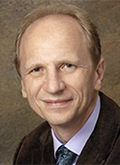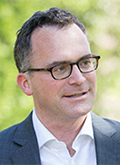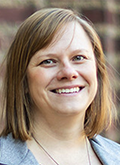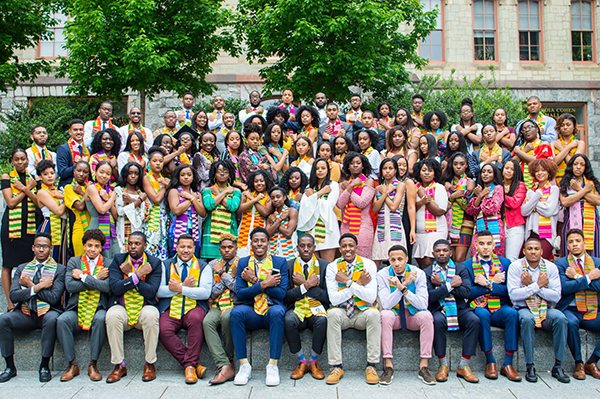On Monday, August 30, 2021, Penn’s Class of 2025 Convocation was held in person in Blanche Levy Park, in front of College Hall.
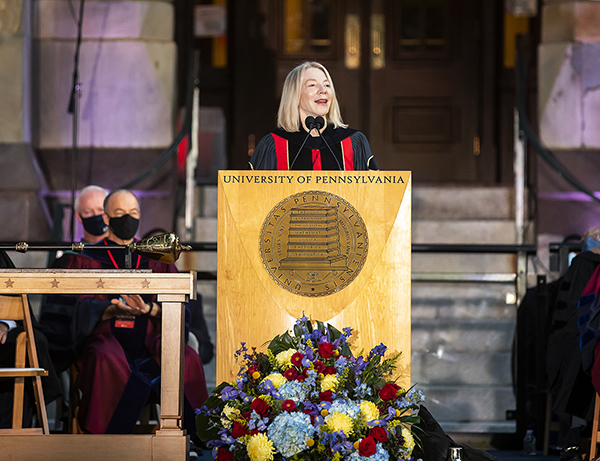
Think Like a Diplomat
President Amy Gutmann
Hello Class of 2025!
There has never been a Convocation quite like this. We’re back!
For this momentous occasion, we get to zone out from Zoom. We are reunited. And it sure feels good!
You are the most diverse, talented, and resilient class ever. Let’s hear it for the great Class of 2025!
More than any class before, you had to become expert navigators. You were given no road map for this pandemic. Lacking any how-to guide, you not only finished high school remotely. You did so with flying colors. You made it to your new University despite the most daunting odds.
Now the first and foremost test you face, while challenging, is also exhilarating. How do I navigate Penn?
I faced the same thing when I arrived more than seventeen years ago as a newbie President. To this day, I still find navigating Penn an uplifting challenge (which may help explain why I still haven’t graduated!).
So: How to do it well?
Imagine for a moment that you are invited to attend a global summit. Nothing less than the future of our world is at stake.
It’s an impressive crowd, impressive in its talent and diversity. You join representatives from nearly 100 countries; all 50 U.S. states; Washington, D.C.; Guam; Puerto Rico; and the U.S. Virgin Islands.
Many are the first in their families to attend such a summit. Many identify as a Black, Asian, Latinx, LGBTQ, or having a disability. Many come from backgrounds in which the social and economic cards were stacked against them.
Though each person has their unique differences, all were chosen for their academic accomplishments, creativity, talent, and drive to do good.
Take this to heart: You are absolutely integral to the global summit that is seated all around you. And you now embark on an exciting journey to make the most of it.
You will make life-changing friendships; you will find a personally meaningful career; you will improve the lives of others, including your family, community, country, and the world: And you have no road map.
What you do have are all the makings of a leader. The most successful combine being both collaborative and independent-minded. Here is what I have found to be the best navigational advice for success. It is deeply rooted in Penn history: Think like a diplomat.
Not long after Penn was founded, back in the 1700s, the American colonies were in trouble. Their war for independence from Britain was not going well. They needed friends. So they sent the greatest mind of the age across the Atlantic to forge an alliance with France. He’s actually sitting among us now: Benjamin Franklin. Not only did he found our University. He was also America’s very first ambassador.
In France, Ben became a pop culture phenomenon. If Instagram had existed, he would’ve been the CEO of going viral. He charmed the royal court with his signature spectacles, simple clothes, and homemade gifts. He dazzled philosophers and merchants alike with his intellect and wit.
His printing press in Paris became synonymous with the transformational ideals of liberty and self-government. The French even named a hair style in Ben’s honor and it was all the rage.
What was key to Franklin’s genius? From differences, Franklin found strength. From competing interests, he forged consensus. In pursuit of aid for his homeland, he lent aid to others. A diplomat par excellence, Ben won the friendship of France and so changed the future for countless people.
What, you may ask, has Franklin’s life to do with my success at Penn? My answer is: Everything!
You can make the most of your new home by thinking like a modern-day diplomat. An excellent start is by celebrating differences, for they are among your signature strengths.
Not very long ago, another amazing Penn alum, Anea Moore, was able to accept Penn’s offer of admission thanks to our financial aid program. She was born and raised in West Philadelphia and was, like me, the very first in her family to attend college.
A student leader, Anea put her experiences as a Black woman and her extraordinary talents to work across campus and beyond. She helped us implement a new initiative to empower our first-generation and low-income FGLI students. From that grew our Penn First Plus program. And in 2019, Anea was named a Rhodes Scholar.
Successful diplomats are both collaborative and independent-minded leaders. To succeed, you will work with and lean on diverse others.
But never forget this: What each of you brings here is uniquely yours. Share it bravely and be curious about the unique differences of others.
Those differences and your own unique perspective make our community increasingly innovative, and ever more inclusive. At Penn, thinking creatively and being curious about others, that’s what leads to breakthroughs.
My latest case in point is a lifesaving one: On an ordinary day, much like any other, two Penn scientists—a woman and a man—crossed paths for the first time at a copying machine.
They chatted briefly about their research interests. By doing so, they discovered something neither had remotely expected. Their projects were quite different, but they found an intersecting interest.
They decided to team up, thinking each might hold a key to the other’s future. That day, unbeknownst to anyone for years to come, history was made.
The two people were Penn Medicine’s Drew Weissman and Kati Karikó. By deciding to collaborate, they together pioneered messenger RNA technology.
It was their breakthroughs that have made the Pfizer and Moderna vaccines against COVID possible. And these vaccines are what have made it possible for all of us to gather here today. We are teaching and learning in person, thanks to their combined collaborative and independent-minded character.
Among the many life-changing lessons to be learned from the examples of Drew and Katie, Ben and Anea are these: Always be open to that chance meeting on Locust Walk, in your College House, or with a faculty member. Though you may be strangers, though you are independently working toward different goals, your collaboration could one day change the world.
At Penn, we succeed by lending a hand.
Countless opportunities await you: Penn Leads the Vote, the Netter Center for Community Partnerships, Fox Leadership, the President’s Engagement and Innovation Prizes, SNF Paideia Fellowships, Social Equity and Community Internships, Young Quakers Community Athletics, and many others.
As Wharton professor Adam Grant has shown, your success only stands to grow from lifting others up. Along the way, never ever hesitate to ask for help whenever you need it. None of us succeeds alone. Not even remotely.
By now, some of you have heard the news about me. I have been nominated by President Biden to serve as the next U.S. Ambassador to Germany.
As I share my thoughts with you today, I vividly remember what it felt like to be a first-year college student, as anxious as I was excited. And now I am both excited and anxious about my future and the future of my family.
My father, a refugee from Nazi Germany, died suddenly when I was a few years younger than you. I was a rising high school senior. My mom and I struggled mightily to make ends meet. Financial aid made it possible for me to go to college. I had imposter syndrome before there was a name for it. And even now, as we together face an uncertain future, I am feeling a lot of what you’re feeling, too.
The advice I give to you is the very same advice I continue to take to the best of my ability.
The power of Franklin’s example. Making the most of our connections to one another, our community, and the wider world. The ongoing urgency of addressing this global pandemic. Doing as much good as we creatively can as soon as we can in partnerships with others.
The transformative people I’ve known and the enduring lessons I’ve learned at Penn are very much front and center for me as they will be for you.
So I can say to you with the greatest compassion and conviction: By being both creative and collaborative, you will make the most of your new home here at Penn.
And you will also make Penn an even more inclusive and innovative, friendly and all-around better home for yourself and everyone around you.
I am so very thrilled to say officially and in person to the great Class of 2025: Welcome to your new home! Welcome to Penn!
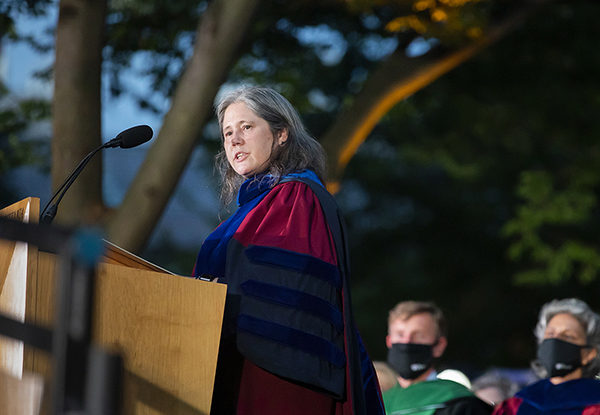
Lessons From a Pandemic Year
Interim Provost Beth Winkelstein
As Interim Provost—Penn’s Chief Academic Officer—it is my great pleasure to welcome you this evening.
Convocation—the first time you’re gathered together, as a class—is a Penn tradition that dates back to the early 1900s. And here I should mention that I attended my own Convocation, as a Penn undergraduate. Not in 1910, but a few years later. Why mention that year in particular? Just as Penn’s Class of 1914 couldn’t have imagined the influenza pandemic waiting around the corner, when you entered high school you had no idea of the disruption to come. And yet: here you are! Penn’s Class of 2025, IRL [in real life]!
There are many lessons to take from our pandemic year. But I think there are two that are especially relevant to your Penn experience. Your path is not set. And we are all connected. Over the next four years, I urge you to embrace this uncertainty, and explore your interconnection.
Sometimes, external events—yes, even a pandemic—will set you off in some new direction. But just as often, change comes from within. You’ll find joy or inspiration in some field or interest that’s new to you. And I’m not speaking solely of academics. Penn has countless opportunities to meet new people and try different things: student organizations, affinity groups, athletics, food, the arts. You’re here to become not just well-educated but well-rounded. It’s a path that goes in all directions.
And when you do decide on an academic track or major, know that this path, too, is not fixed. Your course—your courses—will change. Your major might change. When I entered Penn, I was sure I was going to be a doctor. But a summer in a research lab after my sophomore year changed my direction, and I became a bio-engineer.
New directions can be challenging. Like some of you, I had taken AP courses, so I skipped my first-year math class and went to the 200 level. I got this, I thought. No, I didn’t have it. It was impossible to juggle everything! At least for me. So I dropped a level, and was better for it. Think about your courses and your choices, but try not to stress about them. Let me say that again: please try not to stress. Taking chances—altering course—inevitably brings setbacks. But it may also bring big rewards.
Your classmates and friends, your professors—everyone sitting up here tonight and the thousands of Penn staffers not here—want you to succeed. Which brings me to that second pandemic lesson. Regardless of our differences, in this world we’re all connected. We share a future. Just as you may need help from others, they may need your help. In these challenging times, remember no one succeeds alone. Here, at the nation’s first university, all our schools are on one campus. Penn’s interdisciplinary education is purpose-built for collaboration. Explore these connections, even—especially—when the path seems unclear.
Every class that’s sat where you’re sitting has worked very hard, and overcome major obstacles, to get here. But, honestly, members of the Class of 2025, you have some serious bragging rights. After a year of screen time, I’m just thrilled we finally have some face time.
Welcome to Penn.

 Aurélie Ouss, assistant professor of criminology, has been named Janice and Julian Bers Assistant Professor in the Social Sciences. Dr. Ouss studies how good design of criminal justice institutions and policies can make law enforcement fairer and more efficient. Her research, which has been published in Science, the Economic Journal, the Journal of Political Economy, and the Journal of Public Economics, has received support from Arnold Ventures, J-PAL North America, the Robert R. McCormick Foundation, and the MacArthur Foundation. Before coming to Penn, Dr. Ouss was a postdoctoral fellow at the University of Chicago Crime Lab after completing her PhD in economics at Harvard University.
Aurélie Ouss, assistant professor of criminology, has been named Janice and Julian Bers Assistant Professor in the Social Sciences. Dr. Ouss studies how good design of criminal justice institutions and policies can make law enforcement fairer and more efficient. Her research, which has been published in Science, the Economic Journal, the Journal of Political Economy, and the Journal of Public Economics, has received support from Arnold Ventures, J-PAL North America, the Robert R. McCormick Foundation, and the MacArthur Foundation. Before coming to Penn, Dr. Ouss was a postdoctoral fellow at the University of Chicago Crime Lab after completing her PhD in economics at Harvard University.  Ning (Jenny) Jiang, the Peter & Geri Skirkanich Associate Professor of Innovation in the department of bioengineering of Penn Engineering, has received a Lloyd J. Old STAR Program grant from the Cancer Research Institute (CRI), which is a major supporter of cancer immunotherapy research and clinical trials with the goal of curing all types of cancer.
Ning (Jenny) Jiang, the Peter & Geri Skirkanich Associate Professor of Innovation in the department of bioengineering of Penn Engineering, has received a Lloyd J. Old STAR Program grant from the Cancer Research Institute (CRI), which is a major supporter of cancer immunotherapy research and clinical trials with the goal of curing all types of cancer.  Monique Howard has been appointed the inaugural Senior Director of Women’s Health Initiatives. This new position will work to heighten visibility and strengthen both research and programming that originates out of Penn Nursing’s Center for Global Women’s Health (CGWH).
Monique Howard has been appointed the inaugural Senior Director of Women’s Health Initiatives. This new position will work to heighten visibility and strengthen both research and programming that originates out of Penn Nursing’s Center for Global Women’s Health (CGWH). Igor Brodsky has been appointed chair of the department of pathobiology at the University of Pennsylvania’s School of Veterinary Medicine (Penn Vet), effective October 1, 2021.
Igor Brodsky has been appointed chair of the department of pathobiology at the University of Pennsylvania’s School of Veterinary Medicine (Penn Vet), effective October 1, 2021.
